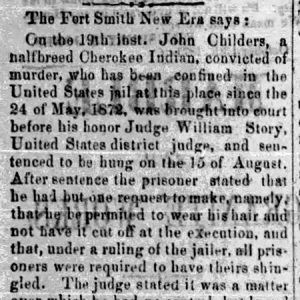calsfoundation@cals.org
John Childers (Execution of)
On August 15, 1873, a Cherokee man named John Childers was hanged at Fort Smith (Sebastian County) for the 1870 murder of Reyburn Wedding.
In his book Law West of Fort Smith, Glenn Shirley describes Childers as “strong, of muscular build, five feet eleven inches in height,…twenty-four years old.” Childers, whose father was white, was born in Cowskin Creek in the Cherokee Nation. According to Shirley, “He had spent his childhood in wickedness.”
In October 1870, Childers met a man named Reyburn Wedding, an Indian trader, near Caney Creek in the Cherokee Nation, just below the Kansas line. Wedding’s wagon was pulled by a splendid black horse, and Childers tried to negotiate a trade. After an extended bargaining session, Wedding still refused to give up his horse, and Childers eventually killed him and took the horse. Childers was arrested by Deputy Joseph Vannoy near Bixby, Oklahoma, in December 1870. After they had gone a scant ten miles, he managed to escape. Vannoy again arrested him on January 26, 1871, and he was taken to Van Buren (Crawford County), then the site of the United States District Court for the Western District of Arkansas. On May 9, the Van Buren Press reported that he and six other men had escaped from the jail in Van Buren on May 3. The Press described them all as “desperate characters…evidence for conviction most positive in all the cases.” Vannoy arrested him for a third time, and he was held for trial in Fort Smith, where the U.S. court had been relocated. He was convicted on November 25, but his attorneys filed a motion for a new trial.
According to the Arkansas Gazette, the court, under Judge William Story, opened on May 13, 1873, but it was “thought [it] would adjourn that evening, as the marshal has no funds to run it.” They did, however, complete at least one item of business. John Childers’s motion for a new trial was denied, and the Gazette opined that “he will probably ‘swing.’”
He was sentenced to hang, and on June 2, 1873, the Richmond Daily Dispatch reported that he “only requests that his hair shall not be cut off while he lives.” In Native American culture, long hair is considered a vital connection to the culture and strength of one’s lineage. The Southern Standard elaborated on this request, commenting that while the judge had no power over this decision, he “hoped the request would be granted.” A Captain Berry, who was in charge of the jail, said that Childers’s request would be granted, and that the “prisoner seemed much pleased.”
The hanging took place on August 15, 1873, and four days later the Van Buren Press published an account of the proceedings. As Childers was led from the jail in front of approximately 2,000 people, he “paced the ground with firm, easy tread, manifesting that cool indifference and courage if you please, that his grey, rambling eye denotes.” During the proceedings, he continued to show indifference “and smoked his cigar with as much nonchalance as if the affair was none of his.” Childers reportedly confessed, expressing regret for his actions and warning others to beware of bad company. He also asked authorities to turn his body over to his sister so she could bury it in the Cherokee Nation. According to Shirley, just before he died, “The killer tossed away his cigar. For the first time since his capture appeared disturbed. He asked Marshal John Sarber, ‘Didn’t you say you were going to hang me?’ Sarber responded in the affirmative, whereupon Childers responded ‘why in the hell don’t you.’” The trap was sprung, but Childers survived for almost fifteen minutes after the drop. Spectators later commented on the “terrible thunder and lightning” which “set in as the soul of the murderer took its flight.” Contrary to his wishes, he was interred in Oak Cemetery in Fort Smith.
For additional information:
Akins, Jerry. “Hangin’ Times in Fort Smith.” Journal of the Fort Smith Historical Society 25 (September 2001): 7–15. Online at https://uafslibrary.com/fshsj/25-02_Complete_Issue.pdf (accessed February 20, 2024).
“The Fort Smith New Era Says.” Southern Standard [Arkadelphia], June 7, 1873, p. 4.
“Hanging of John Childers at Fort Smith on Friday.” Van Buren Press, August 19, 1873, p. 3.
“Jail Delivery.” Van Buren Press, May 9, 1871, p. 3.
“Sebastian.” Arkansas Gazette, May 15, 1873, p. 1.
Shirley, Glenn. Law West of Fort Smith: A History of Frontier Justice in Indian Territory (Oklahoma), 1834–1957. Lincoln: University of Nebraska Press, 1957.
“State News.” Arkansas Gazette, November 28, 1872, p. 2.
Nancy Snell Griffith
Davidson, North Carolina
 Civil War through Reconstruction, 1861 through 1874
Civil War through Reconstruction, 1861 through 1874 Law
Law John Childers Sentencing Article
John Childers Sentencing Article 



Thank you for sharing this information.